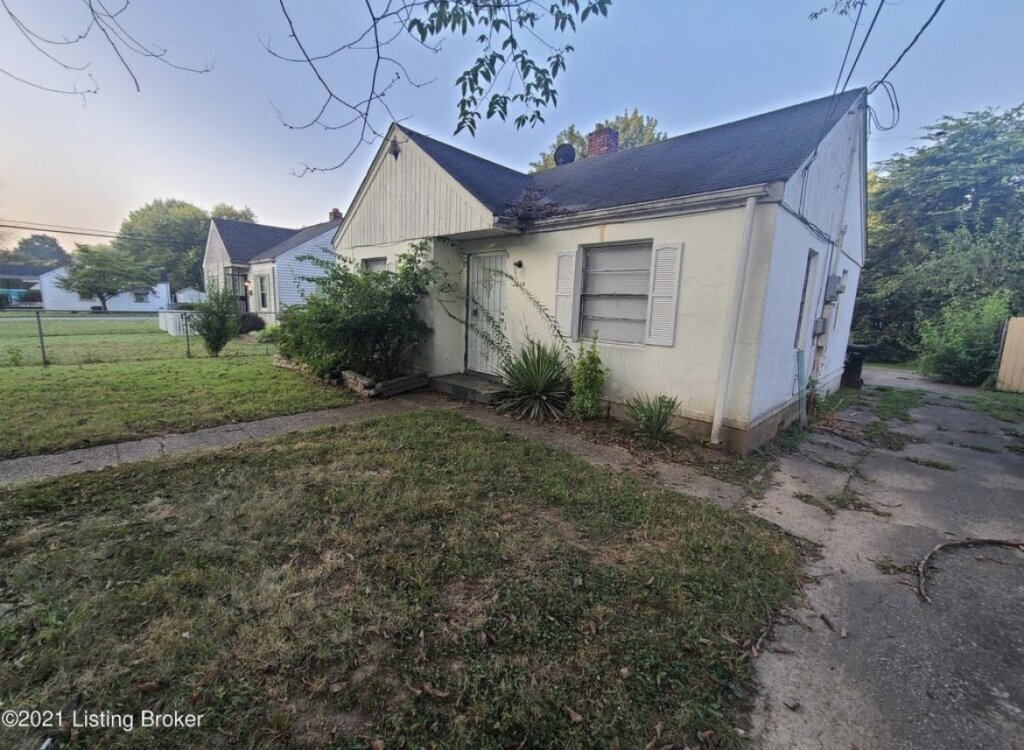
Are you tired of dealing with squatters in Kentucky or Indiana?
If you’re considering selling a house in Kentucky or Indiana because you’re tired of dealing with squatters, we buy houses with squatters. Request a cash offer below to get started or continue reading to learn more about squatters rights👇👇👇.
What are Squatters Rights in Kentucky?
This article is for informational purposes only and is not legal advice. If you’re looking for legal guidance to understand squatters rights in Kentucky we recommend speaking with a real estate attorney specializing in Kentucky evictions.
Does Kentucky Have Squatters Rights?

Yes, squatters have rights by Kentucky law. Squatters Rights, also known as adverse possession, allow an individual to gain ownership of a property by occupying it for a certain period of time without the permission of the owner.
This can happen when it is vacant and unclaimed for an extended period of time. However, squatting on properties that are currently in use or inhabited by the rightful owner is not allowed.
If you’re tired of dealing with bad tenants and considering selling a rental property complete the form below. Or, keep reading to learn more about squatters rights in Kentucky.
Learn More about Squatters Rights
- Understanding Adverse Possession in Kentucky
- What is Color of Title?
- Trespassing vs Squatting?
- Can Police Remove Squatters?
- Can a Tenant Claim Squatters Rights?
- What Not to Do When Evicting Squatters
- How to Get Rid of Squatters in Kentucky?
- What are the Kentucky Eviction Laws?
Understanding Adverse Possession in Kentucky

Adverse possession laws vary by state, but typically, a squatter must occupy the property continuously and openly, and must also pay taxes and make improvements to have rights.
In some states, the squatter must also have the intent to claim ownership of the real estate, and must have held it openly and without permission for a certain number of years, in Kentucky it’s 15 years to claim squatters rights.
In order for a squatter to make an adverse possession claiming rights, they must also have “color of title.“
What is Color of Title?
Color of Title means that the squatter must have a document, such as a deed, that appears to give them a legitimate claim to the real estate, even though it is not actually valid. This can happen if the squatter was given a fraudulent deed or if the original owner did not have rights to sell. To make an adverse possession claim, the squatter must meet certain requirements, including occupying the property continuously and openly, paying taxes, making improvements, and having the intent to claim ownership through an adverse possession claim.
Trespassing vs Squatting? How are Squatter Rights Different?
Trespassing and squatting are both related to the unauthorized use of property, but they unique and rights vary for each.
In some cases a person may be both a trespasser and a squatter. For example, if a person enters an abandoned building in Kentucky without permission and then starts to live there, they would be both trespassing and squatting.
Let’s talk about the difference between trespassing and squatting.

Trespassing refers to the unauthorized entry onto someone else’s property. This can include entering private land, buildings, or vehicles without permission, or remaining after being asked to leave. Trespassing is generally considered a criminal offense, and the owner can take legal action to remove the trespasser and may seek for damages or compensation. In short, in the state of Kentucky they often don’t have rights to stay.
Squatting, on the other hand, refers to the unauthorized use of a property by someone who is not the rightful owner. Squatters are individuals or groups who occupy empty or abandoned buildings or land without permission from the owner. Squatting is usually considered a civil offense, meaning the owner must take legal action in civil court to remove the squatter and may seek compensation. Basically, this means they have rights in the state of Kentucky that must be considered.
It is important to note that squatting does not infringe upon someone’s rights who enters real estate with permission of the owner but stays on the property after permission has been withdrawn or expired. In the US, some states have laws that protect property owners’ rights and allow them to take steps to prevent squatting, such as posting “no trespassing” signs or installing locks to safeguard their property rights.
Can Police Remove Squatters?
Can police remove squatters? Yes, police can remove squatters but the process for doing so depends on the situation. Typically, squatters rights prevent the police from removing squatters unless there is a court order for eviction.
If a landlord has obtained a court order for eviction, the police can assist with the eviction process by escorting them off the property and ensuring that the eviction is carried out in a peaceful and orderly manner, respecting the landlord and squatters rights. However, the police do not have the authority to evict squatters without a court order, emphasizing the importance of legal proceedings to protect property.

In some cases, if a squatter is breaking Kentucky law, such as by breaking and entering, vandalism, or committing other criminal activities, the police may take action to remove the squatter and make an arrest. However, this is not the same as eviction, which is a civil matter.
It’s also important to note squatters rights provide protections under Kentucky law. The police must follow proper procedures and protocols when removing them to avoid any potential legal issues. Therefore, it is advisable for the landlord to consult with an attorney before calling the police.
Can a Tenant Claim Squatters Rights on a Property?

A holdover tenant is a tenant who remains in a rental property after the lease or rental agreement has expired. In other words, a tenant who has overstayed their welcome. The tenant continues to occupy the property and pay rent, but they do not have a legal rights to be there. The landlord may choose to accept the rent and continue the tenancy or, in most cases, terminate the tenancy by serving a notice to vacate or by filing an eviction lawsuit.
Holdover tenants are different from squatter tenants, which are individuals who occupy a property without the permission of the owner or legal tenant. Squatters are not paying rent and don’t have any legal agreement with the owner.
It’s important to note that laws and regulations regarding holdover tenants vary by state, so it’s best for landlords to consult with a lawyer to understand their rights and responsibilities and to determine the best course of action for dealing with a holdover tenant.
4 Things Not to Do When Evicting Squatters to Avoid Breaking Kentucky Law
- Not providing proper notice: Landlords in Kentucky must provide squatters with a proper notice to vacate, which must include the date by which they must leave the property and the consequences if they do not vacate, respecting the squatters rights. Failure to provide proper notice can lead to delays in the eviction process and can also result in the landlord being held liable for damages, underscoring the importance of adhering to legal procedures and protecting the rights of all parties involved.
- Not following the proper legal process: Landlords must follow the proper legal process for evicting squatters by obtaining a court order for eviction. Failure to follow Kentucky law can lead to delays in removing them and can also result in legal penalties for the landlord. Don’t try to side-step the legal process without making the effort to file formal eviction with court.
- Using self-help methods: Landlords cannot use self-help methods, such as changing the locks or shutting off utilities, to remove squatters. This can lead to legal repercussions for the landlord and can also make it more difficult.
- Not consulting with a lawyer: Evicting squatters can be a complex legal process, so it’s important for landlords to consult with a lawyer to ensure that they are following the proper legal procedures and to avoid any potential legal complications.
How to Get Rid of Squatters in Kentucky?
If you have unwelcome guests there are several steps you can take to remove them while respecting Kentucky law and squatters rights:
- Serve them with a notice to vacate: In Kentucky you’re required to give the squatters a notice to vacate the property before taking legal action. This notice should state the date by which they must leave and inform them of the consequences if they do not vacate.
- File an eviction lawsuit: If the squatters do not leave after receiving the notice to vacate, you can file an eviction lawsuit in civil court. This will require them to appear in court and present their case. If the court rules in your favor, the squatters will be ordered to vacate.
- Call the police: If the squatters refuse to leave after being served with a notice to vacate and losing an eviction lawsuit, you can contact the police for assistance in removing them.
- Cash for keys: Quite simply, offering the squatter a financial incentive to vacate can be effective. While it may seem strange to pay someone to leave the time and expense it takes someone to evict someone may be higher than what it costs to motivate someone to move under their own free will.
What are Kentucky Eviction Laws
In Kentucky, evictions are governed by the Kentucky Revised Statutes (KRS) Chapter 383. According to Kentucky law, a landlord must provide a tenant with a notice to vacate before filing an eviction lawsuit. The length of notice required depends on the reason for the eviction:
- For nonpayment of rent, the landlord must provide a 3-day notice to vacate.
- For lease violations, the landlord must provide a 7-day notice to vacate.
- For the end of a lease term, the landlord must provide a 30-day notice to vacate.
If the tenant does not vacate within the specified time frame, the landlord can then file an eviction lawsuit in a Kentucky district court. The court will then set a date for a hearing, at which the landlord and tenant can present their cases. If the court rules in favor of the landlord, the tenant will be ordered to vacate.
A landlord in Kentucky should not evict a tenant without following the proper legal process. This includes serving the tenant with a proper notice to vacate and obtaining a court order for eviction. Additionally, the landlord cannot use self-help methods to evict a tenant, such as changing the locks or shutting off utilities.
How We Can Help You If Have an Unwanted Tenant

As experienced real estate investors, we understand the challenges that come with owning rental properties. Whether it’s dealing with difficult tenants or unexpected repairs being a landlord can be stressful.
That’s why we’re the right company to help you sell your unwanted rental property. With years of experience in the industry, we have dealt with all kinds of landlord problems and know how to navigate them effectively.
Not only can we offer you a fair price for your property, but I can also provide valuable insights and guidance on how to make the selling process as smooth as possible.
So if you’re a fellow real estate investor looking to sell your property, call me at (502) 849-5950. Let’s discuss your specific situation and see how I can help you achieve your goals.
We buy houses with squatters in Kentucky and Indiana including Louisville Kentucky, Frankfort Kentucky, Elizabethtown Kentucky, Owensboro Kentucky, Bowling Green Kentucky, Covington Kentucky, Lexington Kentucky, Paducah Kentucky, Floyds Knobs Indiana, Sellersburg Indiana, Charlestown Indiana, & Jeffersonville Indiana.
About We Buy 502
Hi, I’m Nyx Sherwin owner of We Buy 502. We’re a small, family-owned business located in Louisville, KY and we’ve also called Lexington and Bowling Green home.
We know selling a property can be a long and tiresome process. From repairs, to showings, negotiations and the waiting game to close. We believe there’s a better way to sell real estate that most don’t consider.
Our process to buy your property is straightforward and simple.


Nyx Sherwin, We Buy 502
Hi, I’m Nyx Sherwin owner of We Buy 502. For the last 20 years I’ve called Kentucky home. My wife and I met in Bowling Green, KY at Western Kentucky University. Our youngest daughter was born in Lexington, KY and now we call Louisville, KY home.
In our years of real estate experience we’ve learned selling a property in KY can be a long and tiresome process. From repairs, to showings, negotiations and the waiting game to close.
We believe there’s a better way to sell real estate that most don’t consider. We buy houses, rental property and land that most wouldn’t consider regardless of condition or situation.


